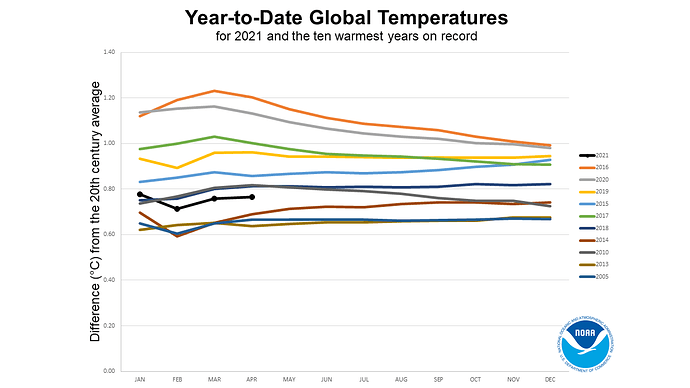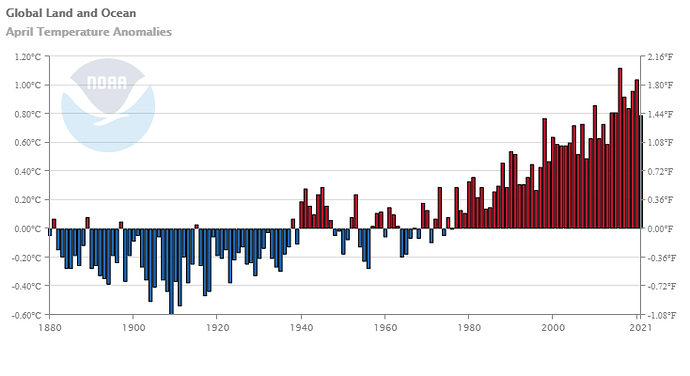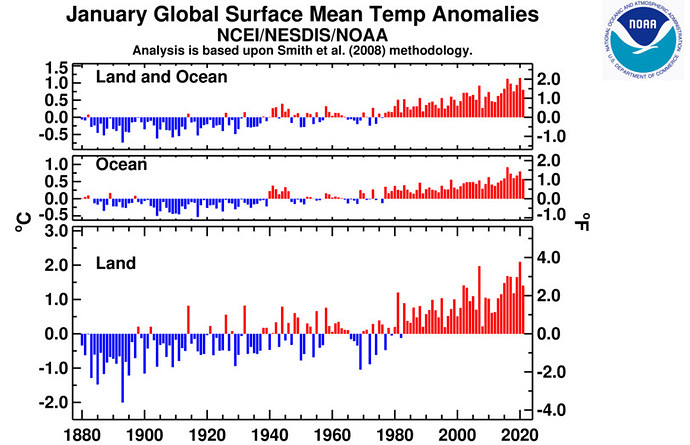In an article from The Guardian, the eminent Earth scientist Johan Rockstrröm argues that we cannot just wait for the world order to change when it comes to tackling the climate crisis – we all have a duty to act now
Scientist argues that we cannot just wait for the world order to change to tackle the climate crisis
Yes, indeed, it will be a problem to deal with CO2 agw IF it is as big of a problem as some claim.
However, the real-life evidence is unclear, with the latest global temps taking one the largest dips on record. Some question where this new twist will lead and what it means for our understanding of how strong the CO2 greenhouse effect really is. So, IF CO2 agw turns out to be much less than projected, then there is no ‘crisis’ and whatever challenge it presents will be manageable - no doubt involving some serious attention, even incorporating some change in our energy sourcing, but all at a much more planned and benefits-driven pace.
Even if that is true (I don’t see that here - so you must be talking about some little dip in the last weeks or maybe months early on this year?) - it still doesn’t undo all the record-high years we’ve been having lately (do you ever get worked up about those?) But even so - science is better.
One late dip here (if it exists) is like us right now in early spring saying, “it remains to be seen if it really is going to warm up this summer, because even just this evening now, it’s cooler than it was this afternoon.”
If one singular dip, even on the scale of months or a couple years, is enough to make you ignore all of science that sees and incorporates all the data it has available, then you will always have excuses to ignore a very well established reality. There will always be something for the doubt-manufacturers to seize on and try to distract people with. But reality is no respecter of those who labor to ignore it.
Disinterested source?
Actually, the YTD global average temp calculated by NOAA reached its latest peak in March 2020 and declined the rest of the year. Then, in the first 4 months of 2021, the YTD global average temp shows a year-over-year drop of roughly 0.4 C - one of the biggest year-over-year drops on record. In climate terms this is short-term, but still noteworthy. Let’s be sure to take note of such things.
‘very well established reality’ ? … well there is a reality that, while the sun was at an historical high (7 consecutive above-average solar cycles 1935-2005) there was a period of unusual warming. At the same time, there was an unusual increase in atmospheric CO2. What remains to be seen is just how much impact each has had, and would presume to have into the future. Be sure you don’t get caught up in a particular conclusion before looking at all the data.
We do. We’re not biased.
I think zooming out can help everyone here. From the same website you got your data from:
Or pick a different month and do the same:
I wonder if anything happened in 2020 that could have decreased air travel, driving, etc.?
The COVID-19 pandemic is impacting human activities, and in turn energy use and carbon dioxide (CO2) emissions. Here we present daily estimates of country-level CO2 emissions for different sectors based on near-real-time activity data. The key result is an abrupt 8.8% decrease in global CO2 emissions (−1551 Mt CO2) in the first half of 2020 compared to the same period in 2019. The magnitude of this decrease is larger than during previous economic downturns or World War II. (source)
That said, I didn’t expect that the global slowdown in burning greenhouse gases would lead to an immediate effect on temperature. And perhaps it didn’t. But regardless, one can’t disprove the established correlation between warming and greenhouse gases by pointing to a short-term temperature decrease that correlates with a short-term greenhouse gas emission decrease.
Don’t worry, we’ll be back to trashing the biosphere this summer as we have been doing for a 160 years.
Of course, you want to see yourself as un-biased - we all do - but we are often not our own best judges.
So, from your apparent perspective that says increasing CO2 was the predominant driver of warming after 1950, can you help me understand how the same (actually a little more) solar energy over 42 years (1965-2006, inclusive) had essentially zero impact on warming, whereas the same time-span (1913-1954), with a little less total solar energy input, was almost exclusively responsible for the substantial warming that happened at that time?
‘decreased air travel, driving, etc ?’ … except that most industry continued and CO2 increased about as much as ever.
On the other hand, near El Nino warming conditions (warm Pacific Ocean surface temp just below the threshold of a full-blown El Nino), plus extended, severe forest fires throughout 2019, all eased off in early 2020. I’m still looking for where the strong CO2 warming drive has gone.
And, of course, it is correct to point out that this latest short-term temp drop is not strong evidence by itself. However, if this latest pause in warming continues through a second consecutive, below-average solar cycle (peak expected circ 2025), then I’d say we are looking at a pattern change that started around 2005. After 20 years or so, a longer-term pattern becomes more evident.
The key result is an abrupt 8.8% decrease in global CO2 emissions (−1551 Mt CO2) in the first half of 2020 compared to the same period in 2019. (source)
The longer-term temp data can be helpful in seeing the long-term. It is pretty clear that we have had significant warming throughout the 20th century.
So, in these charts, you can see, well enough, that the warming in the early part of the century (1913-1954 for discussion purposes) was almost as much as the warming at the end of the century (ie 1965-2005). The former warming is almost completely attributed to the solar energy input at that time (represented at 42,371 total sunspots), whereas a little more solar energy (represented as 50,448 total sunspots) in the later period is said to have had no impact on warming - all of that warming is attributed to increased CO2 for the sake of the models being used. How does the same (even a little more) solar energy input not produce the same amount of warming??!!
Its okay if you don’t have an answer. I haven’t been able to find an answer anywhere. IPCC just declares it so, without explanation. And I’m okay with that, so long as we continue to pay attention to the growing body of evidence, that could soon confirm a pattern change and cause a significant adjustment of our ‘assessment’ of the importance of CO2 agw. However, we have to be open to such a possibility or, with the blinders of pre-judgement, we risk missing it.
And it’s worse than we think.
Dimming the Sun – transcript
Of course, a good volcanic winter or two could ‘help’ in the short term.
What data are you looking at?
Since 1960 or so solar irradiance has decreased but global temperatures have risen.
Vinnie
I suppose saying solar irradiance has decreased may be an overstatement. Its been around 1361W/m^2. Less than a 1 watt/m^2 difference in half a century. Thats 0.073% of a reduction. Nonetheless, temperature had increased significantly.
Vinnie
Air pollution from fossil fuels caused 8.7 million premature deaths in 2018, study finds
Who’d a thunk the sun could do this?
Cute, but still not evidence of CO2 being the dominant driver of global warming.
The Dimming the Sun transcript is not so cute. I don’t suppose you read it.
And you want more evidence? I don’t think lack of evidence is your problem.


